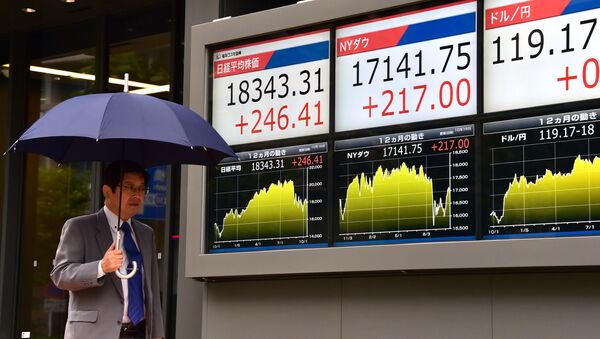Kristian Rouz — The annualized expansion of Japan's exports slowed dramatically in September amidst a decline in overall shipments to mainland China, one of the biggest consumers of hi-tech manufactured goods. A heavily export-reliant industrialized economy, Japan might fall into recession due to the newly emerged risks stemming from international trade. Meanwhile, the Japanese labor market is becoming increasingly tight amidst slowing hiring, thus creating additional pressure on economic expansion by imposing limit on consumer spending.
Japan's trade statistics are the primary driver behind determining the nation's monetary policy: the Bank of Japan (BOJ) has a policy meeting set on 30 October, and the recent developments might trigger additional regulative stimulus and further devaluation of the yen.
Kristian Rouz — The annualized expansion of Japan's exports slowed dramatically in September amidst a decline in overall shipments to mainland China, one of the biggest consumers of hi-tech manufactured goods. A heavily export-reliant industrialized economy, Japan might fall into recession due to the newly emerged risks stemming from international trade. Meanwhile, the Japanese labor market is becoming increasingly tight amidst slowing hiring, thus creating additional pressure on economic expansion by imposing limit on consumer spending.
Japan's trade statistics are the primary driver behind determining the nation's monetary policy: the Bank of Japan (BOJ) has a policy meeting set on 30 October, and the recent developments might trigger additional regulative stimulus and further devaluation of the yen.
![]() The Ministry of Finance reported on Wednesday that Japanese exports only increased by an annualized 0.6% in September, significantly below the previously consensus-anticipated 3.4%. This is the slowest pace in exports expansion since August 2014, whilst this past August Japan's exports rose 3.1%. Expectations were also optimistic in the light of the Trans-Pacific Partnership pact drafted in early October — that, however, might contribute to a mediocre improvement this month.
The Ministry of Finance reported on Wednesday that Japanese exports only increased by an annualized 0.6% in September, significantly below the previously consensus-anticipated 3.4%. This is the slowest pace in exports expansion since August 2014, whilst this past August Japan's exports rose 3.1%. Expectations were also optimistic in the light of the Trans-Pacific Partnership pact drafted in early October — that, however, might contribute to a mediocre improvement this month.
Japan's exports shrank 3.9% in volume due to lower demand from mainland China, but a weaker yen propelled the value of goods shipped into positive territory. Japanese trade has been shrinking in volume for three consecutive months already, the key factor to understanding Tokyo's urge to nail down the TPP deal.
Wednesday's trade data will also be included in Q3 GDP calculations, suggesting a negative tendency: after a slight contraction in Q2, a GDP decline the following quarter would indicate yet another recession for Japan.
There is an upside, however, in Japan's trade dynamics. The value of imports plunged a massive 11%, chiefly due to weakness in commodity prices, but also because of insufficient consumer demand connected with zero inflation. Labor market concerns also weigh heavy as underperforming employment hardly helps acceleration in prices growth.
![]() In Tokyo, financial markets have rejoiced though, as the BOJ is now expected to boost the volume of liquidity injections to help the economy out.
In Tokyo, financial markets have rejoiced though, as the BOJ is now expected to boost the volume of liquidity injections to help the economy out.
In regional statistics, exports to the US rose 10% in September only, bucking the pro-TPP mindset in Japan's zaibatsu. Shipments to Europe added 5.1%, whilst mainland China, as outlined above, received 3.5% less Japanese-made goods. Japan's shipments to Asia in general (consuming half of the Japanese exports) dropped 0.9%, a first yearly slide in seven months.
Crude oil imports rose in volume by 1.1%, suggesting a mediocre rise in industrial activity, however, the value of energy imports crashed 44% year-on-year. Still, Japan posted a trade deficit of 11.5 bln yen ($955 mln) against the previously anticipated surplus of 87 bln yen.
Japan's exports shrank 3.9% in volume due to lower demand from mainland China, but a weaker yen propelled the value of goods shipped into positive territory. Japanese trade has been shrinking in volume for three consecutive months already, the key factor to understanding Tokyo's urge to nail down the TPP deal.
Wednesday's trade data will also be included in Q3 GDP calculations, suggesting a negative tendency: after a slight contraction in Q2, a GDP decline the following quarter would indicate yet another recession for Japan.
There is an upside, however, in Japan's trade dynamics. The value of imports plunged a massive 11%, chiefly due to weakness in commodity prices, but also because of insufficient consumer demand connected with zero inflation. Labor market concerns also weigh heavy as underperforming employment hardly helps acceleration in prices growth.
In regional statistics, exports to the US rose 10% in September only, bucking the pro-TPP mindset in Japan's zaibatsu. Shipments to Europe added 5.1%, whilst mainland China, as outlined above, received 3.5% less Japanese-made goods. Japan's shipments to Asia in general (consuming half of the Japanese exports) dropped 0.9%, a first yearly slide in seven months.
Crude oil imports rose in volume by 1.1%, suggesting a mediocre rise in industrial activity, however, the value of energy imports crashed 44% year-on-year. Still, Japan posted a trade deficit of 11.5 bln yen ($955 mln) against the previously anticipated surplus of 87 bln yen.





